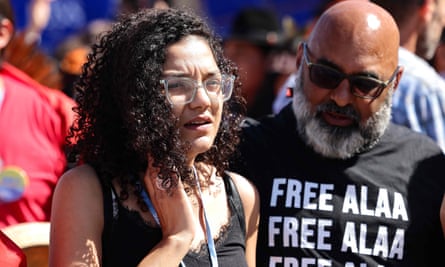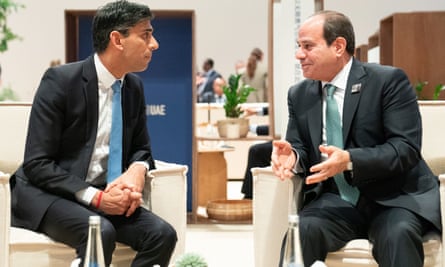The relatives of Alaa Abd el-Fattah, a British-Egyptian writer and activist currently imprisoned, have expressed disappointment in the British government’s lack of action to secure his release. Despite promises made by Prime Minister Rishi Sunak to his sister a year ago, the government has not followed through on their commitment to resolve his case.
Abd el-Fattah was a prominent leader in the 2011 revolution in Egypt that resulted in the removal of President Hosni Mubarak. Due to his involvement in activism, he was imprisoned for the majority of the last ten years. In 2019, he was arrested again after a short period of freedom under police supervision. In December 2021, he received an additional five-year sentence for sharing a post on social media about torture that was deemed to spread false news and undermine national security.
In December 2021, while being imprisoned in Egypt, he obtained British citizenship through his mother, Laila Soueif, who is a prominent human rights advocate.
Sanaa Seif, Alaa’s sister, expressed disappointment in the idea that obtaining British citizenship could lead to Alaa’s freedom. It now seems like it was just a false hope that has caused wasted effort and potentially worsened the situation.
Last year, in the beginning of November, as diplomats gathered in Egypt for the Cop27 climate summit, Abd el-Fattah was on the brink of death, according to his wife. The 42-year-old writer and activist had been on a partial hunger strike for six months to protest his detention conditions, specifically requesting a visit from British officials. In the weeks leading up to Cop27, he intensified his strike by completely abstaining from food and later refusing water, which ultimately led to his collapse.
On November 5th of last year, Sunak sent a message to Seif stating that the government is fully dedicated to resolving Alaa’s case as quickly as possible. He also mentioned that the case is still a top priority for the British government.

He stated that government representatives are still pushing for immediate consular access to Alaa and advocating for his release at the top levels of the Egyptian government.
The situation involving Abd el-Fattah had raised concerns within the British government. Upon receiving a request for information, the Ministry of Defence informed the Guardian that the previous defence minister, Ben Wallace, did not address Abd el-Fattah’s case. However, on November 6th, 2022, the Chief of Defence Staff, Adm Sir Tony Radakin, discussed the matter with his Egyptian counterpart, Lt Gen Osama Askar.
The next day, Sunak had a public meeting with Abdel Fatah al-Sisi, the president of Egypt, during Cop27 in Sharm el-Sheikh. A photo was taken of them shaking hands, which gave the Egyptian leader the comfort he needed despite facing backlash for his handling of Abd el-Fattah and the large number of people being held in custody in Egypt.
Abd el-Fattah finally concluded his strike in the middle of November of the previous year, following being isolated during Cop27 and receiving medical care. However, there was no advancement made in getting a consular visit.
Since Sunak and Sisi’s initial public encounter one year ago, the family of the imprisoned activist has lost hope as the British government has not shown the same level of dedication to his situation as promised by the Prime Minister in his letter. Meanwhile, Egypt continues to block any diplomatic efforts.
There is insufficient proof that the FCDO, No 10, or any other British government establishment has taken significant action to communicate with the Egyptian government in order to secure the release of Abd el-Fattah.
Seif stated that there has been no advancement whatsoever. He expressed his confusion over the fact that Egyptian officials are still delaying, and the British government is accepting it.

Sunak and Sisi reunited on December 1, 2023 at Cop28. During their meeting, Sunak asked about the status of Alaa Abd el-Fattah’s case and reiterated the UK’s request for his release. The details of the meeting were documented.
The British government agency FCDO has continuously refused to provide requested information to Abd el-Fattah’s relatives and has also ignored freedom of information requests from the Guardian. These requests included the number of times British diplomats in Cairo have sought to visit Abd el-Fattah in prison since he obtained British citizenship in 2021.
In February, the Minister for the Middle East, Tariq Ahmad, had a meeting with Soueif. The meeting was also briefly attended by the former Foreign Minister, James Cleverly. Both officials gave assurances that they would increase efforts to share information about their actions regarding Abd el-Fattah’s case. This includes addressing the issue of whether British diplomats had attempted to fulfill his request for a consular visit.
In late November, MP David Rutley stated that Egyptian foreign minister Sameh Shoukry had engaged in discussions regarding the case with multiple ministers, including Ahmad and Cleverly.
The government of Egypt has consistently denied acknowledging Abd el-Fattah’s British citizenship, even though they promptly recognized Seif’s, which she obtained while being held in prison for the alleged crime of “spreading false news” in 2021. Amnesty International has deemed this conviction as unjust and based on false accusations.
Permitting British officials to visit Abd el-Fattah at the desert prison where he is currently detained would serve as a crucial indication of Egypt’s acknowledgement of his British citizenship, and could potentially advance the progress of the case. Making formal requests for consular visits would also demonstrate that Britain is not willing to allow Egypt to continue hindering the case.
However, the FCDO has consistently refused to disclose whether any efforts have been made to visit him while in custody. The Guardian initially made a request for this information via Freedom of Information in January 2023.
In the time that has passed, the FCDO has admitted to possessing the information that was requested, but has continuously delayed and given multiple explanations for not revealing it. These explanations have included the large amount of data requested, concerns over privacy, and the importance of safeguarding UK interests and maintaining trust and confidence in international relations.
The Guardian requested information on the frequency of Cleverly advocating for Abd el-Fattah’s case as a British citizen, but the FCDO refused to disclose. The ministry also refused to disclose the number of times the prime minister has brought up Abd el-Fattah’s case with Sisi.
According to Seif, the new foreign secretary’s predecessor showed complete indifference. Seif believes that if Lord [David] Cameron prioritized it, the task would be completed.
In reply to a different Freedom of Information request, the Department for Business and Trade stated that Sir Jeffrey Donaldson, the trade envoy to Egypt, has had meetings with Egyptian officials since Abd el-Fattah became a British citizen. However, they refused to reveal if he discussed the case during these meetings, citing concerns that it could harm relations between the UK and another country.
Seif stated that it has been two years since they were last able to visit him and this is due to Egyptian officials claiming that they have not completed the necessary paperwork. Seif finds it odd that British officials are accepting this excuse and questions whether it is in everyone’s best interest to do nothing and if it poses a threat to the safety of other British citizens being held overseas.
A representative from FCDO refused to respond to several inquiries regarding the level of transparency of information or any potential requests to visit Abd el-Fattah in jail.
The spokesperson stated that we are advocating for the release of Alaa Abd el-Fattah and we are urging the Egyptian government to take action on this matter. The prime minister brought up Mr. Alaa Abd El-Fattah’s case in a recent meeting with President Sisi, which took place two weeks ago.
Source: theguardian.com


















